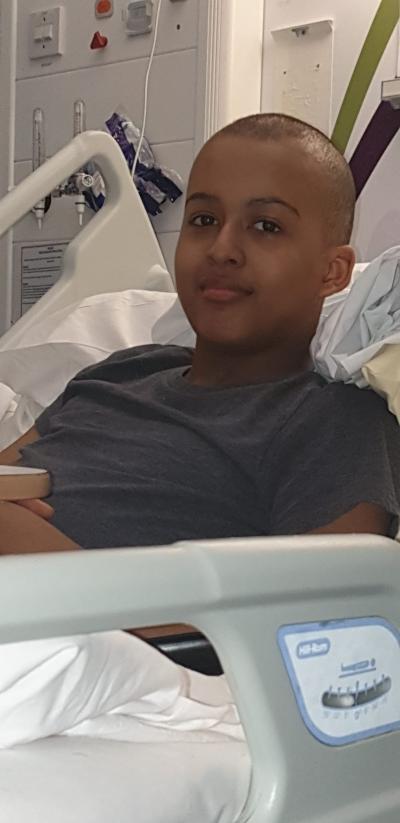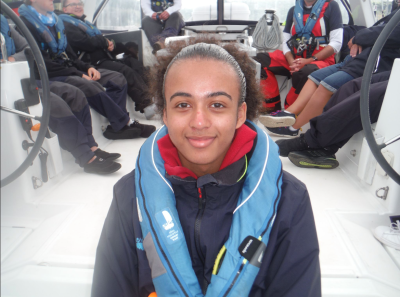I didn't let weight gain or hair loss after chemo define me
Weight gain and hair loss after chemo were just two of the challenges to Callum’s identity when he was diagnosed with Hodgkin lymphoma aged 13. He shared his attitudes, coping methods and story with us, and explained how he stopped cancer and the side effects of treatment defining his identity. Having finished treatment, Callum is now pursuing his interests in theatre and acting, as well as making up on the school time that was interrupted by treatment.
Callum was diagnosed with Stage 4 Hodgkin lymphoma when he was 13. This change obviously made a huge impact on Callum’s life and priorities. School work and his passion for acting was Callum’s main focus before his diagnosis and treatment, but unfortunately this had to change. As he says – “I originally thought that I would just be able to continue things as normal. I kept going to school and carried on with my rehearsals, but I very quickly realised that I didn’t have time or the energy to do everything. I had such bad fatigue and was tired after everything.”
Taking control of his identity was at the centre of Callum’s mind following his diagnosis. Still feeling like himself, regardless of his diagnosis was crucial. One of the ways he did this was talking to his friends, and insisting that they treated him the same as always. They did just that. Callum explains “at times I hated them for it. But it was a great help as it made me feel normal and like I was still me. That was the biggest part for me, taking that control. My friends really helped me cope.”
Within the context of his identity, one of the biggest challenges that Callum faced, was how to come to terms with cancer and treatment impacting his appearance. Hair loss in particular was something which beyond just the aesthetic, impacted his sense of who he was. He says “Nothing prepared me for how quickly I started to lose my hair. I had really big hair and I loved it. It was a huge part of me and my identity. The day after my first chemo session, I ran my hand through my hair, and it started coming out in clumps. I had a breakdown and refused to go to school with clumps of my hair missing. Then I decided to own it and get it cut before it all fell out”. In addition to this, the constant hunger that was brought on by steroids caused another side effect – weight gain. Being able to still recognise himself and feel good about himself became difficult at this time.
When he reached this difficult moment, Callum was able to rely on the help of his Youth Support Coordinator Nic, who was able to tackle some of the psychological obstacles that came in hand in glove with the physical changes brought about by treatment. “I said I felt like the person I was before and the person I was then were two different people, and that I didn’t feel the best version of myself. I didn’t recognise myself. Nic took time to listen to me and we spoke at length. She was a really big part of helping me understand what was happening to me. She also got me some great support from a psychologist at the hospital. The psychologist started to make me feel a lot better as she helped me understand that it wasn’t my fault that I’d gained weight or lost my hair. That was a massive help. If I didn’t understand something I got stressed out, so the psychologist helped me to understand a lot of things and put me at ease. The psychologist used talking therapy and also gave me techniques to help me relax during treatment.”
From the beginning, not allowing cancer to be a defining factor in his sense of self, was something Callum was especially conscious of. Just as he mentioned to his friends he also “made the decision to say to myself: ‘I’m not going to let this define me. I’m not going to let my diagnosis ruin who I’m going to be. I have to take control of it and push forward”. Following on from his own approach, this is Callum’s advice for other young people going through cancer treatment. “Don’t let it change who you are essentially as a person. The person who you were before treatment and during will be two different people, but the key thing is it’s you; you have the power and ability to decide how you are going to respond to it and you can respond to it positively. I’m not going to lie, it will be a hard journey. There will be times where you are sad and don’t want to get through it. You don’t even want to get out of bed. But, you cannot let that take control of you; you need to take ownership of it and see the light at the end of the tunnel. Because there is one and you will get there.”
Flip The Script
Callum started Flip the Script Theatre company in 2022. He is looking to recruit young people from across the UK to write and produce a play about their experience of cancer and their treatment within the health care system.
He wants to recruit up to 12 young people aged 14-18 who have had cancer and have an interest in writing. This core group of writers will meet virtually twice a month for a year to write the play.
He wants to make sure the play is as representative as possible, so he is also looking for young people and their families to share their stories. The themes from these stories will be incorporated into the play. Real names won’t be used, and people can let him know what they are happy to include in the play.
The topic is close to his heart, and he wants the play to advocate for young people. He said: “I noticed that whilst I was treated, and even before my diagnosis, that I was an outsider within the healthcare system. Children’s hospitals are not designed for teenagers, and neither are adult hospitals.
Teenagers are the forgotten age group in healthcare, and I want this play to reflect an experience that is shared by young people across the UK and the hope is that this play can change the way teenagers are treated in the future.
“I want this play to be a call for action and bring to life a collection of stories that most would ignore unless it was staring them right in the face.”
Some people may also get the opportunity to act in the play if it is commissioned for theatres..
“I’m really glad to be back at acting after cancer and Covid took it away from me for a bit. There’s a completely different feeling when you step on stage and the lights come up and you forget about all of the hospital stuff and the illness; it’s a great escape. The auditions can be nerve wracking, but we have a bit of creative license in terms of how we deliver lines.
“Acting allows me to go out, live my life and have fun. I know how important that is as I nearly had it all taken away from me.”
This is not a Teenage Cancer Trust activity.
Please contact [email protected] to find out more about the application process.



